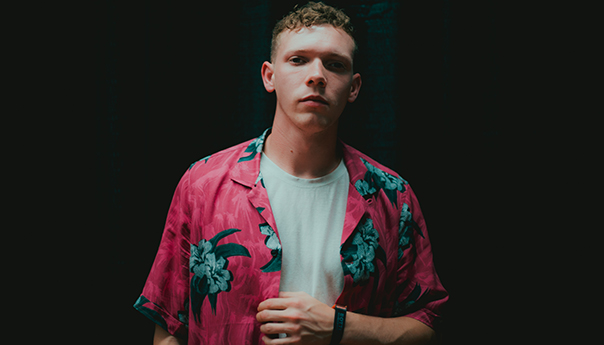Matt Maeson found the straight and narrow on a long and winding road

Photos: Chloe Catajan
The forearms of Matt Maeson are tattooed with a foreboding message: “Born a sinner,” says one. “Die a martyr,” concludes the other.
The statement itself may be pure rock and roll, but that was not the Virginia Beach singer-songwriter’s intention, whose motivation was personal and sadly, tragic. Maeson was raised by a family of convicts-turned-evangelists, who founded a ministry that preached to other convicts, out of and in prison. When he was 5, his uncle was murdered by one of the convicts.
“[He] would hang out with drug dealers and all the people that basically the church wouldn’t accept,” Maeson said. “The people he wanted to reach, and people that he wanted to help, were all the people that the church would outcast, but he just kept hanging out with them anyway. Then one of the dudes just went crazy one time and killed him. Kind of like a modern day martyr. He went out on top, man. … It ended up he lost his life doing that. But that was such an inspiration to me, in how to live my life.”
He himself has done things and been trapped in the same valleys as his parents. At one point Maeson exiled himself from his family when he trapped in drug addiction, sometimes confined to jail time. Reconciling with his family and getting his life in order is what, eventually, set his own music career in motion. Matt Maeson is a peculiar case. At a time when many gospel artists are trying to be identified by more than their faith, he is a mainstream artist whose life and music are defined by his.
By the time he was 19, Maeson (now 25) had given up caring.
“I just didn’t give a shit anymore and so I just started fucking up and selling drugs, doing a lot of drugs, got arrested a bunch of times,” he said.
That sucked three years of his life away, during which time he left his family, but eventually he made a concerted effort to clean up his life. For that, he had a great example in his parents. They had not only cleaned up their lives and were walking the straight and narrow, but went several steps above and beyond.
“My dad became a cop, and worked for cops that had arrested him previously,” he said. “Then he ended up becoming a youth pastor at the church that my uncle was at.”
Maeson’s father progressed as a pastor but finally decided to he wanted to minister to criminals, just like his brother, Maeson’s uncle. He started that ministry that his brother would go on to join.
“He wanted to reach the people that the church doesn’t reach, and so he was, like, ‘I wanna go to prisons, where people are called outcasts and monsters. I wanna do something with that.’”
Maeson’s parents’ ministry consisted not only of preaching at prisons, biker rallies and places in-between, but music—family band-style. In his free time, he performed required community service, working a construction job, and composing the gritty, often hair-raising bluesy folk and rock songs about his personal experiences.
“Darling, can’t you see I’m a broken man with addictive tendencies/ And I love you/ But I don’t think I can learn to love just right,” he sings on “Tribulation,” which serves as an explanation of sorts.
On break-out cut “Cringe,” Maeson sings of how some of his friends pushed him away when he was in the throes of his struggle with drugs and crime: “She said I’m looking like a bad man/ Smooth criminal/ She said my spirit doesn’t move like it did before/ She said that I don’t look like me no more no more/ I said I’m just tired.”
The song blends gospel themes in with the dirt. On “Me and My Friends are Lonely,” he touches both on the loss of his uncle and the ways in which he’s entered society’s underbelly.
“I know things that you don’t/ I’ve met murdering folk/ And they took one of our own/ They took our innocent home/ So is there any lesson in confessing that you posted up/ Like Jesus on the corner selling baggies full of blessing?/ Is it stressing all the things that you have morally accepted?/ Is it vexing wearing clothes that you have bled in?”
“Straight Razor” gets more ominous: “I swore I would never go there/ I’ve healed everything but my shame,” he sings. “Give me a straight razor.” All of these songs appeared on his 2017 EP, Who Killed Matt Maeson, released by Neon Gold Records, which is known more for glossy dance pop.
Maeson followed it up with a second dark roots EP, The Hearse, last spring. On many of his songs, like “Put It On Me,” “Hallucinogenics” and “Unconditional” (which recalls Phosphorescent’s “Song for Zula”), he doesn’t just write about personal experiences, but judges himself from the outside.
You can’t help but want to hug the man and tell him that everything will be all right, even if he knows better.
“Every song I write comes from some kind of personal experience,” Maeson said. “[If] I’m feeling angry about something, I’ll write from a perspective of me doing what I know I shouldn’t do, and I’ll write from the perspective of having done that and what I would think about myself.”
Matt Maeson’s Memorable San Francisco Experience
I don’t really have any great Bay Area experiences. I have some really bad ones. One time when I was just trying to figure my shit out, I drove across the whole country in this tiny little Saturn with one of my buddies. Two days into the trip we hated each other. We go from Virginia all the way to San Francisco. This was 2011 or ’12. All the way to California [he] would not stop playing “California” by Phantom Planet. … He played it for hours, until I ripped the aux out and threw it out the window. We had no money; we’re just crashing on couches. San Francisco’s hills just blew out my brakes, and then blew out the rotors, too, and so we were fucked. Luckily my parents came through with the money to get some new shit.
But before his two records, before this summer’s sets at Bonnaroo, Lollapalooza and BottleRock, he was “a tiny little white kid playing emo songs” at prisons.
“They loved it, man,” he said. “It’s still the best shows I’ve ever played. My parents still do it to this day.”
He started playing some of his own shows and was discovered by an artist organization called Communion, which was founded by Ben Lovett of Mumford & Sons. Communion finds artists and helps them get started. The organization paid Maeson $3,000 to organize a tour, including planning out his travel and lodging, and booking shows.
Maeson countered by quitting his job so he could prepare, and by the time his tour started a month later, he had only $500 left.
He packed up his car and drove around the whole country, sleeping in Wal-Mart parking lots.
“The whole time [I was] thinking, ‘I’m doing this so I don’t have to do it again. Next tour’s gonna be shitty hotels; next tour’s gonna be kind of shitty hotels.’”
Having grown up in church as the pastor’s kid, Matt Maeson saw every possible side of Christianity in the Southeast. He grew to have disdain for some of the often-preached rules that must be followed to reach salvation. People are not saved by their deeds, he decided.
But Maeson’s faith is the biggest, most important thing in his life right now. “It’s what I believe, and I believe it very strongly,” he said. “I love God and I pray every day. I pray to God about what I’m gonna do, where I’m gonna go, what shows I’m gonna do, what people I’m gonna work with. … The gospel to me is all revolving around love and showing people love and acting like Jesus.”
Follow editor Roman Gokhman at Twitter.com/RomiTheWriter. Follow editor Chloe Catajan at Instagram.com/riannachloe.

